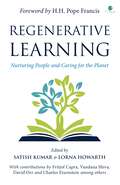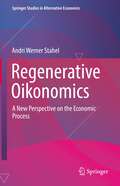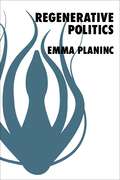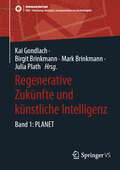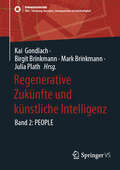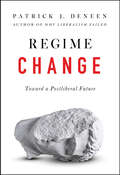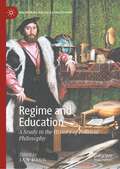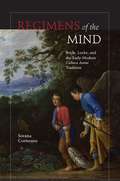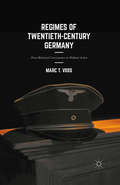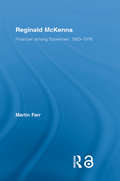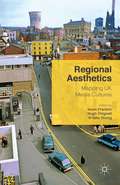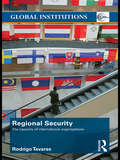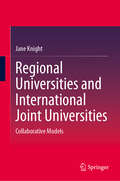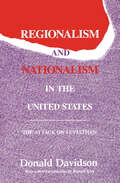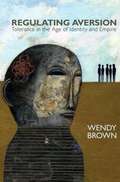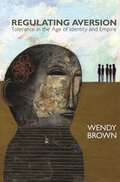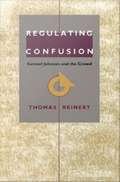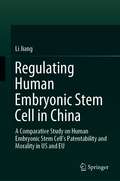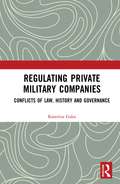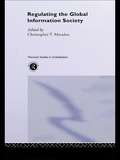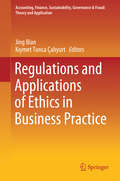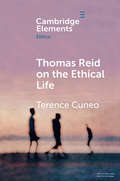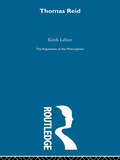- Table View
- List View
Regenerative Learning: Nurturing People and Caring for the Planet
by Satish Kumar Lorna HowarthBe The Change! Are you a policy maker? Parent? Teacher. You'll find in this book fresh ideas as well as practical solutions. Learn how we can make the whole world of education more inspiring – and more green. Education can be – and it should be! – more inspiring, holistic, integrated, creative, and joyous! And that isn't a mere pipe dream. This book will help you to achieve it. Published for the 30th anniversary of Schumacher College, this collection of essays is on a subject of urgent importance for a world afflicted by climate change, inequality, mass disadvantage, and pandemics.The college is synonymous with the effort to create a model of learning that develops alumni who have the skills and passions that will make the contemporary world a better place. Contributors include: Fritjof Capra, Vandana Shiva, David Orr, Charles Eisenstein, Gunter Pauli, Anthony Seldon, Jon Alexander, Alan Boldon, Pavel Cenkl, Lauren Elizabeth Clare, Joseph Bharat Cornell, Guy Dauncey, Alan Dyer, Natalia Eernstman, Guillem Ferrer, Herbert Girardet, Donald Gray, Stephan Harding, Ina Matijevic, Helena Norberg-Hodge, Dana Littlepage Smith, Isabel Losada, Thakur S. Powdyel, and Colin Tudge.
Regenerative Oikonomics: A New Perspective on the Economic Process (Springer Studies in Alternative Economics)
by Andri Werner StahelThis book presents a unique real-world-centred approach to economic life from a phenomenological approach. It offers a much-needed alternative to conventional economic thinking, giving a transdisciplinary depiction of the economic process’s social, cultural, technological, political, and ecological dimensions. Doing so appeals to students and researchers in economics aiming to get an alternative to the reductionist model-based approach.Written in a jargon-free and non-technical way, it appeals to non-economists alike and those seeking a more profound and living understanding of the economic process. What is the role of nature in the economic process? Is there more to economics than we have been told? Do we have infinite needs? What are these needs? Can we keep on growing forever? Does economic growth improve our wellbeing? Why is the income gap widening? What is the role of financial capital in our current world? Are there other forms of producing, distributing, and consuming wealth beyond markets? What are the functions of markets, and how do they work in the real world? These and many other aspects are discussed in living and holistic ways in this book. It is a must-read for all those interested in gaining a more profound and genuine understanding of our current reality and those looking for ways out of our current crises.
Regenerative Politics (New Directions in Critical Theory #98)
by Emma PlanincCritics of liberal democracy from both the left and right view rights not as protectors of freedom but as impediments to self-determination and call for radically regenerative political alternatives. Liberals respond to these challenges by reasserting that universal rights are self-evident, intentionally foreclosing the possibility of remaking the political order. Regenerative Politics makes a bold intervention into this fraught landscape, arguing that the survival of rights depends on abandoning their claims to self-evidence.Emma Planinc argues that liberal democracies must open themselves up to a regenerative politics that accepts all claims against political convention as self-determinative—including those that desire the rejection of rights or the overturning of liberal democracies themselves. Bringing together scholarship on race, democracy, liberalism, fascism, and the far right with an intellectual history of the Enlightenment and the French Revolution and a novel account of human nature, Regenerative Politics offers a new political theory for the revitalization of politics. Planinc shows that liberal democracies can arm themselves against extreme challenges by remaining perpetually open to the reconstitution of rights, restoring the capacity for human beings to determine themselves in the world.
Regenerative Zukünfte und künstliche Intelligenz: Band 1: PLANET (SDG - Forschung, Konzepte, Lösungsansätze zur Nachhaltigkeit)
by Kai Gondlach Birgit Brinkmann Mark Brinkmann Julia PlathDieses Buchprojekt erscheint in drei Teilen mit jeweils einem inhaltlichen Schwerpunkt – PLANET, PEOPLE, PROFIT – und beschäftigt sich übergreifend mit den Nachhaltigkeitszielen der Vereinten Nationen (Sustainable Development Goals, SDGs). Dieser erste Band behandelt die ökologische Dimension der Nachhaltigkeit und umfasst Beiträge, die explizit oder implizit SDGs mit Umweltbezug thematisieren. Die Beiträge und Grußworte international renommierter Expert:innen aus Wissenschaft und Praxis werden durch Begleittexte der Herausgebenden ergänzt. „Wir wissen genug, wir können genug. Wir müssen uns jetzt trauen, den richtigen Weg einzuschlagen“, aus dem Grußwort von Prof. Dr. Johan Rockström, Potsdam-Institut für Klimafolgenforschung.
Regenerative Zukünfte und künstliche Intelligenz: Band 2: PEOPLE (SDG - Forschung, Konzepte, Lösungsansätze zur Nachhaltigkeit)
by Kai Gondlach Birgit Brinkmann Mark Brinkmann Julia PlathDer Band basiert auf den 17 Entwicklungszielen (SDGs) der UNO und entwickelt für die Wirtschaft Zukunftsperspektiven zum Zusammenhang von KI und Nachhaltigkeit.
Regime Change: Toward a Postliberal Future
by Patrick J. DeneenFrom Notre Dame professor and author of Why Liberalism Failed comes a provocative call for replacing the tyranny of the self-serving liberal elite with conservative leaders aligned with the interests of the working classClassical liberalism promised to overthrow the old aristocracy, creating an order in which individuals could create their own identities and futures. To some extent it did—but it has also demolished the traditions and institutions that nourished ordinary people and created a new and exploitative ruling class. This class&’s economic libertarianism, progressive values, and technocratic commitments have led them to rule for the benefit of the &“few&” at the expense of the &“many,&” precipitating our current political crises. In Regime Change, Patrick Deneen proposes a bold plan for replacing the liberal elite and the ideology that created and empowered them. Grass-roots populist efforts to destroy the ruling class altogether are naive; what&’s needed is the strategic formation of a new elite devoted to a &“pre-postmodern conservatism&” and aligned with the interest of the &“many.&” Their top-down efforts to form a new governing philosophy, ethos, and class could transform our broken regime from one that serves only the so-called meritocrats. Drawing on the oldest lessons of the western tradition but recognizing the changed conditions that arise in liberal modernity, Deneen offers a roadmap for these changes, offering hope for progress after &“progress&” and liberty after liberalism.
Regime and Education: A Study in the History of Political Philosophy (Recovering Political Philosophy)
by Ian DaggThis volume is an inquiry into the history of political philosophy by way of the general theme of education. Each contributor addresses the relationship between a particular political philosopher’s broad teaching on the best political order and that political philosopher’s teaching about education. The unifying contention of the work is that each political philosopher considered in the volume promotes a certain kind of political regime and therefore a particular mode of education essential to that regime. Each chapter, written by a separate contributor, is distinguished from the others primarily by the political philosopher being considered. The book has a chapter dedicated to each of the following political philosophers: Plato, Xenophon, Aristotle, Machiavelli, Bacon, Locke, Rousseau, Tocqueville, and Nietzsche. The volume provides a survey of educational models by some of the greatest thinkers of the West, while continually demonstrating that the two themes of politics and education are inseparable.
Regimens of the Mind
by Sorana CorneanuIn Regimens of the Mind, Sorana Corneanu proposes a new approach to the epistemological and methodological doctrines of the leading experimental philosophers of seventeenth-century England, an approach that considers their often overlooked moral, psychological, and theological elements. Corneanu focuses on the views about the pursuit of knowledge in the writings of Robert Boyle and John Locke, as well as in those of several of their influences, including Francis Bacon and the early Royal Society virtuosi. She argues that their experimental programs of inquiry fulfill the role of regimens for curing, ordering, and educating the mind toward an ethical purpose, an idea she tracks back to the ancient tradition of cultura animi. Corneanu traces this idea through its early modern revival and illustrates how it organizes the experimental philosophers' reflections on the discipline of judgment, the study of nature, and the study of Scripture. It is through this lens, the author suggests, that the core features of the early modern English experimental philosophy--including its defense of experience, its epistemic modesty, its communal nature, and its pursuit of "objectivity"--are best understood.
Regimes of Twentieth-Century Germany: From Historical Consciousness to Political Action
by Marc T. VossRegimes of Twentieth-Century Germany is a concise theory of and empirical study on action consciousness as an integral dimension of historical consciousness with specific emphasis on National Socialist Germany and the German Democratic Republic.
Regimes of Violence: Toward a Political Anthropology
by John ProteviA wide-ranging examination of the roots—and possible future—of violence in human societies Is aggression inevitable among humans? In Regimes of Violence, John Protevi explores how human violence originates and exists in our societies. Taking humans as biocultural (that is, our social practices shape our bodies and minds), he shows how aggression does not arrive from any purely biological predisposition but rather occurs only in social regimes of violence that, by manipulating the ways in which culture can shape our biological inheritance of rage and aggression, condition the forms of violence able to be expressed at any one time. Offering detailed insights into human aggression throughout history, Protevi&’s analysis ranges from evolutionary psychology to affective ideology and finally to an alternate politics of joy. He examines a wide range of seemingly disparate topics, such as cooperation between early nomadic foragers, organized sports, berserkers and blackout rages, the experiences of maroons escaping slavery, the January 6 invasion of the United States Capitol building, and responses to the Covid-19 pandemic. As he entwines the philosophical with the anthropological, he asks readers to consider why humans&’ capacity for cooperation and sharing is so persistently overlooked by stories that focus on aggression and warfare. Regimes of Violence is an important contribution to studies of Deleuze and Guattari, uniquely combining cutting-edge investigations in psychology, history, evolutionary theory, cultural anthropology, and philosophy to examine the &“political philosophy of the mind.&” Presenting to readers a refreshingly optimistic perspective, Protevi demonstrates that we are not doomed to war and argues that humans can build a world based on antifascism, joy, and mutual empowerment.
Reginald McKenna: Financier among Statesmen, 1863–1916 (British Politics and Society)
by Martin FarrReginald McKenna has never been the subject of scholarly attention. This was partly due to his own preference for appearing at the periphery of events even when ostensibly at the centre, and the absence of a significant collection of private papers. This new book redresses the neglect of this major statesmen and financier partly through the natural advance of historical research, and partly by the discoveries of missing archival material. McKenna's role is now illuminated by his own reflections, and by the correspondence of friends and colleagues, including Asquith, Churchill, Keynes, Baldwin, Bonar Law, MacDonald, and Chamberlain. McKenna's presence at the hub of political life in the first half of the century is now clear: in the radical Liberal governments of 1905–16, where he acted as a lightning conductor for the party; during the war, where he served as the Prime Minister's deputy and the principal voice for restraint in the conduct of the war; and as chairman of the world's largest bank, where until his death in office aged eighty, he prompted progressive policies to deal with the issues of war debt, trade, mass unemployment, and the return to gold.
Regional Aesthetics: Mapping UK Media Cultures
by Hugh Chignell Ieuan Franklin Kristin SkoogThis book is about forms of media that have reflected or increased consciousness of - a sense of place or a regional identity. From landscape painting in the Romantic era to newspaper coverage of devolution, the chapters explore, through contextualized case studies, the aesthetics of a wide range of local, regional and grassroots forms of media.
Regional Security: The Capacity of International Organizations (Global Institutions)
by Rodrigo TavaresRegional organizations are an inescapable feature of global politics. Virtually all countries in the world are members of at least one regional or other intergovernmental organization. The involvement of international organizations in the realm of regional peace and security, and their cooperation in this domain with the United Nations, has reached an unprecedented level. Regional organizations have traditionally been formed around economic, political, or environmental objectives, however, over the last decades these organizations have gradually penetrated into the security sphere and developed their capacities in conflict prevention, peacekeeping, or post-war reconstruction. In Europe, Africa, Asia, or the Americas, regional and other intergovernmental organizations have been concurrently empowered by the UN and their own member states to maintain peace and security. Despite suffering from important discrepancies in both their mandates and capacities, regional organizations have become indisputable actors that play a role from the outbreak of a crisis to the reconstruction efforts in the aftermath of a conflict Presenting the most up-to-date critical and comparative analysis of the major regional security institutions, assessing a wide range of regional organizations and providing an accessible and comprehensive guide to 11 key organizations, this book is the first systematic study of the capacities of the most recognized intergovernmental organizations with a security mandate. Regional Security is essential reading for all students of international organizations, peace and security studies and global governance.
Regional Universities and International Joint Universities: Collaborative Models
by Jane KnightThis book offers an in-depth analysis of two collaborative models of international higher education institutions: international joint universities (IJUs) and supranational regional universities (RUs). They are based on close partnerships among countries and institutions and thus differ from the single state university model as well as international branch campuses or franchise universities. Key features of these institutions are examined through the use of conceptual frameworks and ten in-depth case studies from all regions of the world. Distinguishing characteristics such as shared governance and management practices; collaborative academic programs and the development of joint laboratories, research networks, and centers of excellence are analyzed. A study of the driving rationales for IJUs and RUs reveals commonalities and stark differences. While international joint universities are commonly single campus institutions, regional universities can be single, multiple campus or virtual. IJUs and RUs are understudied phenomena as more attention and research is focused on the rise of international branch campuses. Academic leaders, policy makers, higher education scholars and students will benefit from the analysis of the key features, rationales and benefits of international collaborative university models and how they can contribute to 1) providing increased and diversified access to education, 2) promote regional identity and facilitate bilateral and regional collaboration for education, research and innovation; 3) contribute to stronger regional and international relations between countries through knowledge diplomacy; and 4) address contemporary global and regional issues. At the same time, it is important to acknowledge potential risks and uncertainties related to quality assurance, qualification recognition, financial stability, research integrity, knowledge security, and sustainability that can be linked to collaborative models of international higher education institutions.
Regionalism and Nationalism in the United States: The Attack on "Leviathan"
by Donald DavidsonA quarter of a century before Lyndon B. Johnson popularized the slogan ""The Great Society,"" Donald Davidson wrote his critique of Leviathan, the omnipotent nation-state, in terms that only recently have come to be appreciated. ""Leviathan is the idea of the Great Society, organized under a single, complex, but strong and highly centralized national government, motivated ultimately by men's desire for economic welfare of a specific kind rather than their desire for personal liberty. "" Originally published as The Attack on Leviathan, this eloquent volume is an attack on state centralism and an affirmation of regional identity.Davidson's work is a special sort of intellectual as well as social history. It reveals an extraordinary mastery of the literature on regionalism in the United States, with special emphasis on the work on Rupert Vance and Howard Odum in the social sciences. Davidson looks at regionalism in arts, literature, and education. He favors agriculture over industrialization, and ""the hinterland"" over cities, examining along the way varying historical memories, the dilemma of Southern liberals, and the choice of expedience or principles. His book is a forceful and commanding challenge to those who would push for central authority at the sacrifice of individual and regional identity. Davidson concludes with a devastating critique of nationalism leading to a supra-nationalism. Ultimately, the heterogeneity of human desires comes up against the uniformity of world systems and world states. Davidson offers instead a broad world of intellectual history and commentary in which individualism allies itself with communities as a means for stemming the tide of collectivism and its base in a world state. For Davidson, Leviathan, the monstrous state, is a devourer, not a savior. As several peoples rise to strike down their own Leviathans, this courageous book may be better understood now than it was in 1938.Donald Davidson</
Regulating Aversion: Tolerance in the Age of Identity and Empire
by Wendy BrownTolerance is generally regarded as an unqualified achievement of the modern West. Emerging in early modern Europe to defuse violent religious conflict and reduce persecution, tolerance today is hailed as a key to decreasing conflict across a wide range of other dividing lines-- cultural, racial, ethnic, and sexual. But, as political theorist Wendy Brown argues in Regulating Aversion, tolerance also has dark and troubling undercurrents. Dislike, disapproval, and regulation lurk at the heart of tolerance. To tolerate is not to affirm but to conditionally allow what is unwanted or deviant. And, although presented as an alternative to violence, tolerance can play a part in justifying violence--dramatically so in the war in Iraq and the War on Terror. Wielded, especially since 9/11, as a way of distinguishing a civilized West from a barbaric Islam, tolerance is paradoxically underwriting Western imperialism. Brown's analysis of the history and contemporary life of tolerance reveals it in a startlingly unfamiliar guise. Heavy with norms and consolidating the dominance of the powerful, tolerance sustains the abjection of the tolerated and equates the intolerant with the barbaric. Examining the operation of tolerance in contexts as different as the War on Terror, campaigns for gay rights, and the Los Angeles Museum of Tolerance, Brown traces the operation of tolerance in contemporary struggles over identity, citizenship, and civilization.
Regulating Aversion: Tolerance in the Age of Identity and Empire
by Wendy BrownTolerance is generally regarded as an unqualified achievement of the modern West. Emerging in early modern Europe to defuse violent religious conflict and reduce persecution, tolerance today is hailed as a key to decreasing conflict across a wide range of other dividing lines-- cultural, racial, ethnic, and sexual. But, as political theorist Wendy Brown argues in Regulating Aversion, tolerance also has dark and troubling undercurrents. Dislike, disapproval, and regulation lurk at the heart of tolerance. To tolerate is not to affirm but to conditionally allow what is unwanted or deviant. And, although presented as an alternative to violence, tolerance can play a part in justifying violence--dramatically so in the war in Iraq and the War on Terror. Wielded, especially since 9/11, as a way of distinguishing a civilized West from a barbaric Islam, tolerance is paradoxically underwriting Western imperialism. Brown's analysis of the history and contemporary life of tolerance reveals it in a startlingly unfamiliar guise. Heavy with norms and consolidating the dominance of the powerful, tolerance sustains the abjection of the tolerated and equates the intolerant with the barbaric. Examining the operation of tolerance in contexts as different as the War on Terror, campaigns for gay rights, and the Los Angeles Museum of Tolerance, Brown traces the operation of tolerance in contemporary struggles over identity, citizenship, and civilization.
Regulating Confusion: Samuel Johnson and the Crowd
by Thomas ReinertWith the urbanization of eighteenth-century English society, moral philosophers became preoccupied with the difference between individual and crowd behavior. In so doing, they set the stage for a form of political thought divorced from traditional moral reflection. In Regulating Confusion Thomas Reinert places Samuel Johnson in the context of this development and investigates Johnson's relation to an emerging modernity. Ambivalent about the disruption, confusion, perplexity, and boundless variety apparent in the London of his day, Johnson was committed to the conventions of moral reflection but also troubled by the pressure to adopt the perspective of the crowd and the language of social theory. Regulating Confusion explores the consequences of his ambivalence and his attempt to order the chaos. It discusses his critique of moral generalizations, concept of moral reflection as a symbolic gesture, and account of what happens to the notion of character when individuals, having lost the support of moral convention, become faces in a crowd. Reflecting generally on the relationship between skepticism and political ideology, Reinert also discusses Johnson's political skepticism and the forms of speculation and action it authorized. Challenging prevalent psychologizing and humanistic interpretations, Regulating Confusion leaves behind the re-emergent view of Johnson as a reactionary ideologue and presents him in a theoretically sophisticated context. It offers his style of skepticism as a model of poise in the face of confusion about the nature of political truth and personal responsibility and demonstrates his value as a resource for students of culture struggling with contemporary debates about the relationship between literature and politics.
Regulating Government Ethics
by Chonghao WuThis book examines government ethics rules and their enforcement in China (as well as in three other jurisdictions for comparative insights). Empirical research methods (involving primarily semi-structured interviews) were employed to explore the dynamics of actual enforcement policies and practices in China. This book formed an analytical framework through reviewing existing theories on government ethics regulation and general regulation literature and analyzing government ethics rules in the US, the UK, and Hong Kong. Using this framework, it seeks to explore the patterns and features of government ethics rules and their enforcement in China. It shows that the inadequacy of government ethics rules per se and the deterrence-oriented criminal enforcement style of government ethics regulation are important but ignored elements of the problem of rampant corruption in China. Such analysis has generated important and practical policy implications for China's government ethics rules and their enforcement.
Regulating Human Embryonic Stem Cell in China: A Comparative Study on Human Embryonic Stem Cell’s Patentability and Morality in US and EU
by Li JiangThe general scope of the book is the patentability and morality of human embryonic stem cell research in US, EU and China. The book observes fraudsters operate unsafe human embryonic stem cell therapies and officialdom turns a blind eye to the immoral human embryonic stem cell research in China. The book highlights that both patent control and federal funding control are inefficient and ineffective way to monitoring human embryonic stem cell research. The book finally proposed an approach for china to regulating human embryonic stem cell research-regulating research itself at the reconciled international regime. The potential reader includes academics and practitioners dealing with intellectual property, patent law and stem cell inventions. The topic discussed will also be interesting to a broad readership, including experts, regulators, policy makers and medical researchers in both ethical and legal disciplines in the field of embryonic stem cell research.
Regulating Private Military Companies: Conflicts of Law, History and Governance
by Katerina GalaiThis work examines the ability of existing and evolving PMC regulation to adequately control private force, and it challenges the capacity of international law to deliver accountability in the event of private military company (PMC) misconduct. From medieval to early modern history, private soldiers dominated the military realm and were fundamental to the waging of wars until the rise of a national citizen army. Today, PMCs are again a significant force, performing various security, logistics, and strategy functions across the world. Unlike mercenaries or any other form of irregular force, PMCs acquired a corporate legal personality, a legitimising status that alters the governance model of today. Drawing on historical examples of different forms of governance, the relationship between neoliberal states and private military companies is conceptualised here as a form of a ‘shared governance'. It reflects states’ reliance on PMCs relinquishing a degree of their power and transferring certain functions to the private sector. As non-state actors grow in authority, wielding power, and making claims to legitimacy through self-regulation, other sources of law also become imaginable and relevant to enact regulation and invoke responsibility.
Regulating the Global Information Society (Routledge Studies in Globalisation)
by Christopher T. MarsdenAn outstanding line-up of contributors explore the regulation of the internet from an interdisciplinary perspective. In-depth coverage of this controversial area such as international political economy, law, politics, economics, sociology and internet regulation. Regulating the Global Information Society covers the differences between both US and UK approaches to regulation and establishes where policy is being made that will influence the future direction of the global information society, from commercial, democratic and middle-ground perspectives.
Regulations and Applications of Ethics in Business Practice (Accounting, Finance, Sustainability, Governance & Fraud: Theory and Application)
by Kıymet Tunca Çalıyurt Jing BianThis book presents a variety of discussions from different countries about regulations and applications of ethics in business practice. It demonstrates how Ethics, both in the world of business and in academic life, is consistently a central and unavoidable issue that institutions must devise new regulations on a regular basis to address. Given that applying such regulations becomes complicated in a global business landscape and that International companies have lost large amounts of revenues due to fraudulent activities, the book provides insights for professionals in business world to teach, learn, apply, measure and report on companies' daily business. Business and Professional Ethics: Theories, Standards, and Analysis is essential reading for researchers and students in business schools around the world.
Reid's Ethics (Elements in Ethics)
by Terence CuneoThis Element presents Thomas Reid's agency-centered ethical theory. This means, one according to which agency intersects with the subject matter of ethics in a sufficiently wide range of important ways that we cannot satisfactorily engage in ethical theorizing without committing ourselves to and, ultimately developing, particular understandings of agency. Reid's agency-centered approach to ethics is introduced, and some ambiguities and puzzling features of his understanding of these components of agency are discussed. The Element explores how Reid might respond to challenges raised by the Aristotelian-Thomistic tradition, on the one hand, and sentimentalism, on the other. The distinctiveness of Reid's approach is also examined here, indicating ways in which his view is not characteristically modern.
Reid-Arg Philosophers (The\arguments Of The Philosophers Ser.)
by Keith LehrerThis book is available either individually, or as part of the specially-priced Arguments of the Philosphers Collection.
